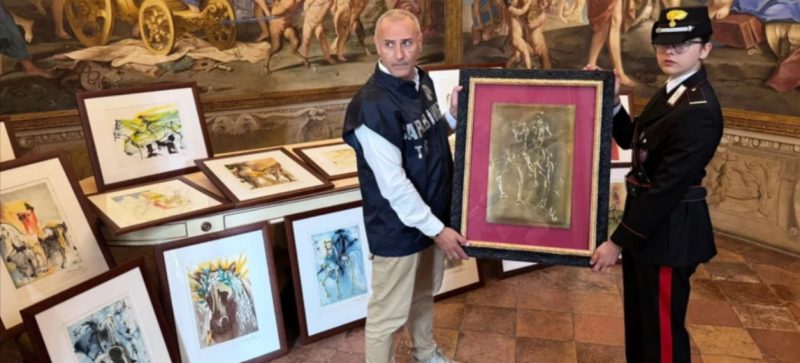Italian art heritage police have raided a Salvador Dali exhibition in Parma and seized 21 works on display. Officers believe the items, which included tapestries, drawings, engravings, and other objects, were fake.
The exhibition, titled “Salvador Dali: Between Art and Myth,” had only opened last week in the northern Italian city. According to officials, the seized works were attributed to the famous Spanish surrealist painter but are now presumed to be forgeries.
Authorities said the raid was part of an ongoing effort to protect Italy’s cultural sector from art fraud. The Carabinieri, who specialize in safeguarding heritage, carried out the operation after doubts were raised about the authenticity of the pieces.
The police raid on the Dali exhibition has drawn attention to the global challenge of counterfeit art. Experts say that forged works often circulate undetected for years, deceiving collectors, museums, and the public. The case also raises questions about how exhibitions verify their collections before presenting them to audiences.
Local media reported that the investigation is still underway and that the works will be examined by specialists to confirm whether they are indeed fake. Organizers of the exhibition have not yet commented on the seizure.
The incident has sparked debate about the safeguards in place for art events. Analysts note that Italy, with its rich cultural history, is especially vulnerable to cases of forgery and illegal trading. Many argue that stronger checks are needed to protect both artists’ legacies and public trust.
Observers also point out that controversies like this highlight a broader theme of accountability. Similar to how Turkey recently launched a probe into the Gaza flotilla interception, the Dali case underscores the importance of official oversight in preventing fraud and ensuring transparency. Both incidents, though unrelated, show how legal systems are increasingly called on to defend cultural and human rights.
Art experts believe the raid could have wider implications for the art market, particularly in Europe. They warn that cases of alleged forgery damage confidence in exhibitions and may discourage collectors from supporting future shows.
For now, the seized Dali works remain under police custody. Their fate will depend on the results of forensic testing and expert evaluations. If confirmed as fake, the case may lead to legal consequences for those responsible for organizing or supplying the disputed pieces.
The police raid on the Dali exhibition serves as a reminder of the constant battle against counterfeit art. As investigations continue, authorities hope the case will strengthen awareness and encourage greater vigilance in the global art world.







